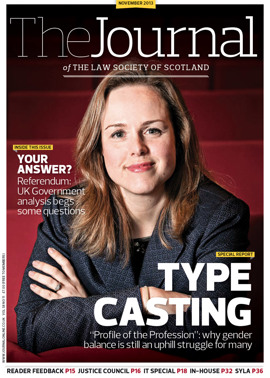File reviews - how they can help

The very mention of file reviews can arouse fear and loathing. However, file reviews/audits of both current and completed matters are a means of maintaining universally high standards and consistency of practice over time. Reviewing files is not a purposeless bureaucratic exercise.
A well thought-out file review system, the nature and purpose of which has been communicated to and accepted by everyone in the firm, can contribute significantly to the management of risk.
- Risk Management: A systematic approach to risk management is needed in every firm. Fact. However, it is for each firm to determine whether that approach should include a file review system.
- Supervision: An effective file review system can play a critical role in any strategy to improve supervision. A file review system isn't, on the other hand, a substitute for supervision; the two go hand in hand.
- Knowledge: File reviews give supervisors the opportunity to see first hand exactly what standard of service fee-earners are providing to clients.
File reviews can also be a useful business tool in helping to:
- detect and deter inappropriate behaviour;
- support the learning and development of both the reviewee and reviewer;
- provide the opportunity to identify areas for an individual's development;
- mitigate risks.
What do they involve?
There is no one-size-fits-all review process suitable for every firm. You need to consider what is appropriate for your firm - which files to look at, what to look for, how often files should be reviewed, and what should be done with the results. The system that works for your firm will depend on many factors, such as the number of fee earners, and the areas of expertise.
Whose files are to be reviewed?
There should be accountability for all, from the senior partner to the most junior fee earner, so that proper file reviews are seen to be a part of a firm's culture and taken seriously as a useful risk management tool.
How many files? How often?
The number of files to review, how often to review and how to select/allocate them are all issues for debate. Certainly, files should be chosen at random (although matters for high-risk clients and files relating to high-risk work should be specifically targeted) and, ideally, the review should address both live and closed matters.
Who will be the reviewer?
Wherever possible, regular random file reviews of a representative sample of the work being undertaken by each fee earner should be carried out by someone in the firm who has not been involved in the day-to-day conduct of the matter.
In some firms, the right policies may be in place and/or the office manual may say the right thing, but, unless those charged with conducting file reviews give them sufficient priority, the system will fail. Some reviewers see it as a monthly horror, taking up a whole afternoon/day's fee earning. As a result, it is no wonder they will seek to avoid it if they can.
Some supervisors still have the "sink or swim" mentality in relation to junior staff, but this often leads to lack of confidence in juniors.
Those who "swim" sometimes get through their work without actually knowing what they did right, or, more importantly, wrong! Supervisors may need training too. File reviews may pick up instances
where a fee-earner is being let down by his or her supervisor, as well as highlighting areas where the fee earner may require further training.
What are the files to be reviewed for?
Ideally, file reviews should focus on both the firm's established systems and procedures, and substantive legal content. There is little point in having a file where all the legal issues have been identified and properly addressed, if this is not evident because the file is a mess and there are shortcomings in communications with the client and other parties. Similarly, a well organised file is of little value if the quality of advice is substandard.
What should the reviewer be looking for?
Some matters can be easily dealt with by reference to a tick box; other matters, including the assessment of the legal advice given, will require a more considered approach. Some of the issues to be addressed should include:
- Is there an engagement letter clearly outlining what the firm will/will not be undertaking for the client?
- Has the client been kept up to date?
- Have all the relevant legal issues been identified/addressed correctly?
- Has the issue of costs been properly managed and communicated to the client throughout?
- Has the fee earner ventured outside their level of knowledge/area of expertise?
- Are there clear attendance notes of meetings, discussions and telephone calls with the client/other parties?
- Have instructions/advice been confirmed in writing?
- Have all critical dates been identified, recorded and acted upon in a timely manner?
- Does the work undertaken comply with the engagement letter?
What follows file reviews?
Don't brush the results under the carpet. They can give life to the concept of continuous improvement. If a file review identifies issues which need to be addressed, make sure that corrective action is taken immediately, or at least within a reasonable time. Recommendations for improvements in office procedures, or case or file management arising out of file reviews, should be discussed at appropriate levels and implemented on a timely basis.
You know they make sense!
Stress, heavy workloads, demanding clients and personal problems can all take their toll and affect personal performance – status within the firm provides no guarantee of perfect client service.
Regular file reviews, in the context of an open and supportive environment, can be an effective means of identifying difficulties with specific individuals, or firm-wide issues that need attention, before they become a major problem. They can also encourage a culture of accountability and dialogue, which is essential to effective supervision and risk management.
Whatever system you have in place, risk management, best practice, supervision and file reviews can collectively ensure that the service provided to clients is of the highest quality. That's got to make good business sense!
Nada Jardaneh and Marsh
Nada Jardaneh is a former solicitor in private practice, who works in the Finpro (Financial and Professional Risks) National Practice at Marsh, a global leader in insurance broking and risk management. We are grateful for the assistance of Andrew Nickels, risk manager at Master Policy co-insurer, Zurich Financial Lines, for his contribution to this article.
The information contained in this article provides only a general overview of subjects covered, is not intended to be taken as advice regarding any individual situation and should not be relied upon as such. Insureds should consult their insurance and legal advisers regarding specific coverage issues.
In this issue
- Obituary: Professor Ian Willock
- Competition damages – a rocky road ahead?
- Heart of the matter
- Law reform on track
- Turning back the clock
- Golf and the right to roam
- Reading for pleasure
- Opinion column: Ros McInnes
- Book reviews
- Profile
- President's column
- Fee review open to views
- Some more equal than others
- Balancing act
- Paving the road to reform
- Blue sky thinking?
- A singular status
- You pay your money
- Acceptable BYOD use
- Interesting times still
- Aliment in vogue again
- Scottish Solicitors' Discipline Tribunal
- Speakers rise creatively to the challenge
- Why environmental indemnity?
- SYLA presents...
- How not to win business: a guide for professionals
- File reviews - how they can help
- Ask Ash
- Making the Act work
- Law reform roundup
- From the Brussels office
- Fraud alert revived
- "Start the conversation"






